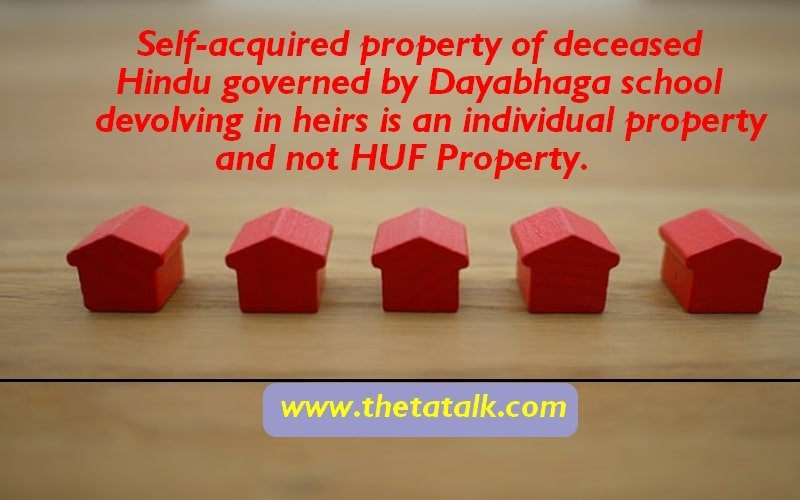![]()
Self-acquired property of deceased Hindu governed by Dayabhaga school devolving in heirs is an individual property and not HUF Property.
The supreme court in the case of Commissioner of Wealth Tax vs Gauri Shankar Bihar has held that Self-acquired property of deceased Hindu governed by Dayabhaga school devolving in heirs is an individual property and not HUF Property.
COMMISSIONER OF WEALTH TAX vs. GAURI SHANKAR BHAR
SUPREME COURT OF INDIA
K.S. Hegde, A.N. Grover & H.R. Khanna, JJ.
Civil Appeal No. 163 of 1969
8th November, 1971
(1971) 39 CCH 0511 ISCC
(1972) 1972 CTR 0095 (SC) : (1972) 84 ITR 0699
Legislation Referred to
Section WT 3, WT 3
Case pertains to
Asst. Year 1959-60
Decision in favour of:
Assessee
K.S. HEGDE, J.
The learned Solicitor-General appearing for the CWT very appropriately conceded that the property with which we are concerned in this case was the individual property of the deceased Prafulla Chandra Bhar. He also conceded that on the death of the said Prafulla Chandra Bhar the property devolved on his heirs in severalty. Each one of his heirs took a definite share in the property left by the deceased. In view of that concession it is not necessary for us to decide in this case whether a Dayabhaga Hindu family can be considered as an HUF within the meaning of s. 3 of the WT Act, 1957.
- Quite clearly on the facts of this case the heirs of the deceased took the property of the deceased in separate shares. Therefore, in law each one of them is liable to pay wealth-tax as an individual. It cannot be said that an individual who inherits some property from some one becomes an HUF merely because he is a member of the HUF.
- In this view of the matter we find no substance in this appeal and the appeal is accordingly dismissed. The respondent has not appeared in this case. Hence there will be no order as to costs. We are thankful to Mr. T. A. Ramachandran for appearing as amicus curiae in this case at our request.

